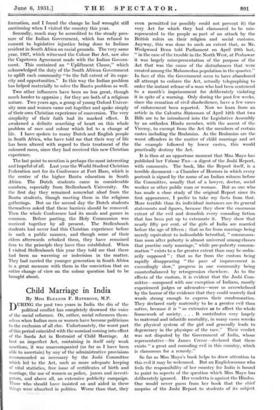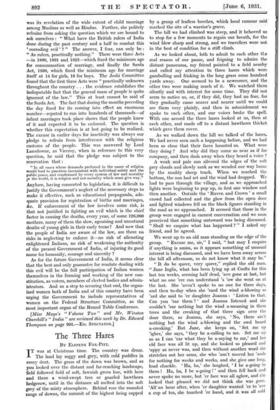Child M arriage in India
By MISS ELEANOR F. RATHBONE, M.P. DURING the past two years in India the din of the political conflict has completely drowned the voice of the social reformer. Or rather, social reformers them- selves when Indian men or women have become politicians to the exclusion of all else. Unfortunately, the worst part of this period coincided with the nominal coming into effect of the Sarda. Act in Restraint of Child Marriage. At best an imperfect Act, containing in itself only weak sanctions, it was unaccompanied (so far as I have been able to ascertain) by any of the administrative provisions recommended as necessary by the Joshi Committee which led to the Act, such as more adequate keeping of vital statistics, free issue of 'certificates of birth and marriage, the iise of women as police, jurors and investi- gators, and above all, an extensive publicity campaign. Those who should have insisted on and aided in these things were absorbed in politics. Worse than that, they even permitted (or possibly could not prevent it) the very Act for which they had clamoured to be mis- represented to the people as part of an attack by the British rulers on their religion and social customs. Anyway, this was done to such an extent that, as Mr. Wedgwood Benn told Parliament on April 29th last, " in the case of the trouble in the North West, at Peshawar it was largely misrepresentation of the purpose of the Act that was the cause of the disturbances that were created among the Mahomcdan population in the quarter." In face of this the Government seem to have abandoned all attempt to enforce the Act, actually telegraphing to order the instant release of a man who had been sentenced to a month's imprisonment for deliberately violating it in spite of a warning. Only during the past few weeks, since the cessation of civil disobedience, have a few cases of enforcement been reported. Now we learn from an article in the Calcutta Statesman of April 12th that two Bills are to be introduced into the Legislative Assembly by an orthodox Hindu member, with the assent of the Viceroy, to exempt from the Act the members of certain castes including the Brahmins. As the Brahmins are the worst offenders in the matter of child marriage and set the example followed by lower castes, this would practically destroy the Act.
It is thus at an opportune moment that Miss Mayo has published her Volume Two—a digest of the Joshi Report, with comments. The book, like the Report itself, is a terrible document—a Chamber of Horrors in which every portrait is signed by the name of an Indian witness before the Committee, usually that of a lawyer, doctor, social worker or other public man or woman. But as one who has made a close study of the original Report since its first appearance, I prefer to take my facts from that. More terrible than its individual instances are its general statements and figures, because they show the enormous extent of the evil and demolish every consoling fiction that has been put up to extenuate it. They show that nearly fifty per cent. of the girls of India are married before the age of fifteen ; that so far from marriage being merely equivalent to indissoluble betrothal, " consumma- tion soon after puberty is almost universal among classes that practise early marriage," while pre-puberty consum- mation " exists to a far greater extent than may be ordin- arily supposed " ; that so far from the custom being rapidly disappearing " the pace of improvement is exceedingly slow," progress in one community being counterbalanced by retrogression elsewhere. As to the effects of the custom, it is evident that the Joshi Com- mittee--composed with one exception of Indians, mostly experienced judges or advocates—were so overwhelmed by the horror of the evidence that they could scarcely find words strong enough to express their condemnation. They declared early maternity to be a greater evil than suttee, because it is " so extensive as to affect the whole framework of society. . . . It contributes very largely to maternal and infantile mortality, in many cases wrecks the physical system of the girl and generally leads to degeneracy in the physique of the race." Their verdict was not disputed by the Government of India, whose representative—Sir James Crerar—declared that there exists " a great and corroding evil in this country, which is clamorous for a remedy."
So far as Miss Mayo's book helps to draw attention to this evil it may be welcomed. But an Englishwoman who feels the responsibility of her country for India is bound to point to aspects of the question which Miss Mayo has deliberately ignored. Her vendetta is against the Hindus. One would never guess from her book that the chief surprise of the Joshi Report to students of its subject was its revelation of the wide extent of child marriage among Muslims as well as Hindus. Further, she politely refrains from asking the question which we are bound to ask ourselves : " What have the British rulers of India done during the past century and a half to combat this corroding evil ' " The answer, I fear, can only be : " As rulers, practically nothing." There were three Acts —in 1860, 1891 and 1925—which fixed the minimum age for consummation of marriage, and finally the Sarda Act, 1980, which fixed the minimum age for marriage itself at 14 for girls, 18 for boys. The Joshi Committee found that the first three Acts were " practically unknown throughout the country . . . the evidence establishes the indisputable fact that the general mass of people is quite ignorant of the law." This at least cannot be said of the Sarda Act. The fact that during the months preceding the day fixed for its coming into effect an enormous number—reputed to run into hundreds of thousands—of infant marriages took place shows that the people knew of it and expected it to be enforced. The question is whether this expectation is at last going to be realized.
The excuse in earlier days for inactivity was always our pledge to refrain from interference with the religious customs of the people. This was answered by Lord Lansdowne, as Viceroy, when in reference to this very question, he said that the pledge was subject to the reservation that :
" In all cases where demands preferred in the name of religion would lead to practices inconsistent with individual safety and the public peace, and condemned by every system of law and morality in the world, it is religion and not morality which must give way."
Anyhow, having consented to legislation, it is difficult to justify the Government's neglect of the necessary steps to make it effective, such as educational propaganda, ade- quate provision for registration of births and marriages, &c. If enforcement of the law involves some risk, is that not justified in fighting an evil which is the chief factor in causing the deaths, every year, of some 126,000 mothers, many of them the slow, agonising and unnatural deaths of young girls in their early teens ? And now that the people of India are aware of the law, are there no risks in neglecting to enforce it—no risk of alienating enlightened Indians, no risk of weakening the authority of the present Government of India, of injuring its good name for humanity, courage and sincerity ?
As for the future Government of India, it seems clear that the best and only guarantee for resolute dealing with this evil will be the full participation of Indian women themselves in the framing and working of the new con- stitution, as voters, members of elected bodies and admin- istrators. And as a step to securing that end, the organ- ized women both of India and of this country have been urging the Government to include representatives of women on the Federal Structure Committee, as the most important organ of the Round Table Conference.
[Miss Mayo's " Volume Two " and Mr. Winston Churchill's " India" are reviewed this week by Dr. Edward Thompson on page 901.—ED. SPECTATOR.]







































 Previous page
Previous page